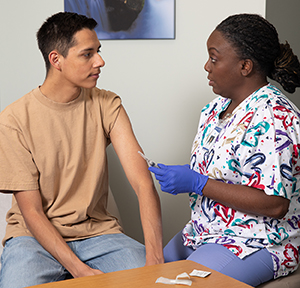For Teens: Understanding Hepatitis
Hepatitis is a disease that harms the liver through inflammation. It can be caused by fat in the liver, alcohol, drugs, herbs, medicines, toxins, obesity, or immune or genetic conditions. But it's most often caused by a viral infection. This is called viral hepatitis.
There are five types of viral hepatitis. The most common in the United States are hepatitis A, B, and C.
Hepatitis A. It is highly contagious. People, especially children, can spread the virus without feeling sick themselves. It's usually spread through:
-
Sexual activity with an infected person.
-
Close personal contact with an infected person.
-
Eating food or drinking water that was contaminated by an infected person.
-
Using drugs with an infected person.
Hepatitis B and C. These are spread through contact with infected blood or body fluids. Hepatitis B and C can be spread through:
-
Bodily fluids like blood and semen.
-
Sex with an infected person.
-
Sharing contaminated needles, syringes, or drug preparation equipment.
-
Sharing contaminated items such as toothbrushes, razors, or medical equipment (like a glucose monitor) with a person who has hepatitis B.
-
Direct contact with the blood or open sores of a person who has hepatitis B.
-
A puncture from a needle or other sharp instruments that have been exposed to blood from a person who has hepatitis B.
-
Childbirth. A baby may get the infection if they are born to someone who has hepatitis B.
Although the hepatitis B virus can be found in saliva, it is not spread through kissing or sharing utensils. Hepatitis B is not spread through sneezing, coughing, hugging, breastfeeding, or through food or water.
Hepatitis D. This only occurs in people with Hepatitis B. It is spread in the same ways as the hepatitis B virus.
Hepatitis E. This most commonly spreads through water contaminated with fecal matter. People may also get hepatitis E by eating undercooked pork, deer, or shellfish. It is especially dangerous if you are pregnant. It can cause serious problems, such as stillbirth, premature birth, or low birth weight.
Viral hepatitis can get better without treatment. Hepatitis A is an acute liver infection that usually gets better in a few weeks without treatment. Hepatitis A doesn't stay in your body long term. Hepatitis B and C can quickly go away or become chronic infections. Your chances of getting better without treatment depend on your age when you are infected. Chronic hepatitis can still be treated. Hepatitis B can be controlled but rarely cured. Hepatitis C can often be cured. In some cases, hepatitis can lead to severe liver damage and even death.
A vaccine can help prevent hepatitis A and B. If you’re at risk, ask your doctor about it. There are no vaccines to prevent hepatitis C and E.

What to look for
Hepatitis may show symptoms soon after your liver gets inflamed, such as with hepatitis A. But some types may not show symptoms for months or even years after the start of the disease. Over time, liver damage may cause serious health problems.
Early stage symptoms can include:
Later stage symptoms are:
Treatment
Hepatitis A can be treated with rest and support care until it goes away. It's not chronic (long term). There is no antiviral therapy for hepatitis A infection.
Types B and C often become chronic. You will be referred to a special doctor. They can help you learn more about the disease and how to manage it. You will also have checkups to make sure your liver is still working the right way. If your blood tests show that hepatitis B is damaging your liver, you will be given antiviral medicines to lower the chances of liver damage and other problems. Hepatitis C can be cured with oral medicines called direct-acting antiviral medicines, usually taken for 8 or 12 weeks.
If you have a nonviral type of hepatitis, see a specialist to help manage and treat your disease. Don't drink alcohol. If it is hard for you to stop drinking, talk to your doctor about attending a treatment program. Try to maintain a healthy weight, exercise, and manage any other conditions like diabetes. This is important no matter what type of hepatitis you have.
Learn how to manage stress and anger. A condition called metabolic dysfunction-associated steatohepatitis is becoming a common cause of hepatitis, even in teens.
If you don’t get treated
Hepatitis A and E infections are usually mild and will go away. Hepatitis B and C can stay in the body and keep damaging the liver, leading to cirrhosis and eventually liver failure. They also raise your risk of liver cancer. After many years, a liver transplant may be needed. Drinking alcohol and being overweight can make the disease worse. So it's important to not drink alcohol and to stay at a healthy weight.
How to prevent hepatitis
-
Never share piercing, tattoo, or drug needles, or other equipment used to prepare drugs. Hepatitis B and C can spread through infected needles.
-
Do not share any personal items, including toothbrushes, razors, and nail clippers. They could be contaminated with saliva, semen, or blood.
-
Never have unprotected sex. Use latex condoms. If you or your partner is allergic to latex, use polyurethane condoms.
-
If you think you may have been exposed to hepatitis B or C, see your doctor right away. In some cases, doctors may recommend a medicine called hepatitis B immune globulin to help prevent infection. You will also be tested for HIV.
-
If you are traveling to countries where hepatitis B is common and you haven’t received the hepatitis B vaccine, talk with your doctor. Try to get all the shots before you go. If you don’t have time to get all the shots before you travel, get as many as you can.